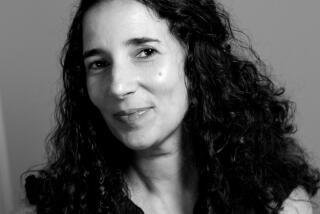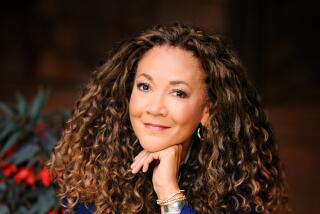‘The Very Sad Part . . . Is That We’re All People’
- Share via
On Oct. 3 in “We’ve Made Progress, but at What Cost?” Sandy Banks wrote of her mother, who grew up in the segregated South, of her own memories of being one of the children who integrated white schools in the Midwest and of her daughters, growing up in the racial and cultural kaleidoscope of Los Angeles. The following are reader responses to that column.
*
Dear Sandy Banks,
I am in my mid-40s, born in America, the son of Holocaust survivors. I grew up in Brooklyn until the sixth grade, when we moved to a little town in New Jersey that did not permit blacks or Jews. Exactly how and why we were “allowed” to stay would take more thought and time for me to articulate. I now live in Los Angeles.
Last night I wrote a check, a modest donation, to Operation Understanding D.C., a nonprofit educational organization based in the Washington, D.C., area that is building a future generation of black and Jewish leaders who will fight racism and bigotry.
My goddaughter is a participant, one of the kids who traveled to the South this summer with other kids, black and Jewish, who walked some of those bridges that the freedom marchers walked in the ‘60s.
My 17-month-old daughter is a little bit of a United Nations herself--my wife is Chinese, born and reared in Malaysia.
Your article resonated and I wanted to write to you just to say you did good . . . your article did good. I am planning and hoping that my daughter will also grow up in a positive and progressive environment.
*
Thank you for your article. I share some similar experiences. My children attend Sherman Oaks Elementary and, although their mother is white, they are still dark enough to have to deal with race.
My 9-year-old, a couple of years ago, ask me if he was a nigger. I discovered that this had come from one of his schoolmates. I tried to explain to him as best I could the origin of this term and why he should not allow it to bother him.
*
Your description of the historical differences between the world in which your mother grew up, you grew up, and your children are growing up gives me hope for the future of the world. And your introspection about the price and the reward is invaluable. I wish more people could view it as you have.
I’m going to ramble and probably go on too long--old people do that--but your article really touched a nerve and brought a warm glow to my heart. I’m not going to tell you anything that you don’t already know, but I feel like putting it all together in one place.
Being a small child is much more difficult than we adults give it credit for. Children are unpurposefully cruel. Differences of all kinds are pointed up and jeered without cruel intent, but hurtfully nevertheless.
One of my granddaughters had surgery to replace a dead nerve in her face. While she now smiles quite prettily, she doesn’t look quite like everyone else. She regularly comes home from school with tears in her eyes because she has been teased about it. But she is OK. She has good friends, she enjoys life, and she is well-liked.
My point is that every child has pain in their life and part of what we do as responsible parents is help them deal with it. I will bet that you had some things to say about Katey, who told your daughter that “all black people are stupid.” I will also bet that the things that you said did not put Katey down, but addressed the things that Katey had been taught, why she did what she did, and why she was wrong. You used the incident to add a couple more planks to a bridge instead of tearing a couple of planks off of it. Am I right?
In Israel, Arabs and Jews kill each other. In Africa, Hutus and Tutsis. In Ireland, Catholics and Protestants. In India, Hindus and Muslims. In Bosnia, Christians and Muslims. And on and on and on. In America we have some of that but, in general, we have become much more tolerant.
That is not to say that we are out of danger, which is why I think our growth is worth the price that our children are paying. I think that as long as our children and their thoughtful parents of all races continue to move toward true ethnic blindness, we will avoid ethnic warfare. That’s why it’s worth the price.
*
Thank you for the fine writing. No excessive verbiage. Clear-cut cloth right out of your heart.
I still remember the first black boy I made fun of. I think it was third grade. A new kid was in school, quiet, with glasses, sort of a little gentleman. It wasn’t so much that I called him a nigger; it was how I took the lead in showing some classmates of mine how to act that bothers me to this day.
To the credit of my principal at the time (1954), I did get in trouble. Later in my life, some have said I went to the other extreme, leading demonstrations, searching out black friends.
Now I am a middle-aged father settled comfortably into a mind-set of thanking my stars that I didn’t have to carry the false burden of black skin. Thanks for your strength.
*
That was a great column. Like Rodgers and Hammerstein wrote, “You have to be carefully taught” to hate and fear. It does not come naturally to children.
*
You’re right. It’s progress, but at what cost? The very sad part in all this is that we’re all people. We all know basic values, we know what hurts and what helps, yet we fight each other. Why?
I’m very glad your little girl has her three friends. Absence of color and other cultures in my young years left me with a void; and sadly, it’s one I’ve not worked very hard to fill. I’ve not got any children, but I try with each opportunity to tell kids to be kind and try to understand others. Adults are much tougher, but occasionally I attempt the same admonition.
*
As a 70-year-old Jewish male who grew up in Philadelphia, the son of a Florida cracker who, with all of his family, hated blacks, I found your article fascinating. My father once told me that his father (my grandfather, whom I never met) belonged to the Ku Klux Klan.
And now, two generations later, we count as our dearest friends a black couple who live in Altadena. James is a lawyer who, three weeks ago, with special authority from the legal system, performed the marriage ceremony for my Jewish stepson and his Catholic bride.
Our world is changing. I see many positive aspects to all this, and urge you to be of good cheer, that we really seem to be moving toward a world where people more and more, as Dr. King said, accept others for what is in their heart, and not reject them because of the color of their skin.
*
I’m fiercely black, very independent and totally human. I grew up in Dayton, Ohio. I was 14 when the Little Rock Nine thing went down. My Ohio neighborhood schools were integrated, K-12. The neighborhood I grew up in was “integrated”--until whites could afford to move out. I thought those Arkansas white folks were trifling, sorry, ignorant, hateful and vicious. In regard to social issues, so is most of the country now.
Social integration primarily began when school or work started and ended when it was over in Dayton in my formative years, the 1950s. The nation is still like that.
Living in America inevitably produces “collateral damage” in people of color. When push comes to shove, the sad truth is that you cannot fully “trust” or have “faith” in mainstream America. To do so is to deny history, contemporary reality and human nature.
A black parent, in addition to the usual and necessary love and guidance, has to give a child the necessary “extras” of a black historic and cultural perspective. The challenge is to help a child develop positive and appropriate self-esteem and a realization of both the limitations, characteristics and circumstances of things as they were and are. And to have realistic expectations and goals while still having a dream.
It’s all about developing autonomy, ego strength, historic and contemporary knowledge and perspective, and personal integrity and character. And thinking and taking appropriate actions.
About maximizing potential: A white “stamp of approval” is unnecessary.
More to Read
Sign up for Essential California
The most important California stories and recommendations in your inbox every morning.
You may occasionally receive promotional content from the Los Angeles Times.










